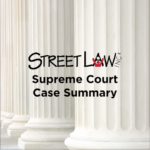1968 was a tumultuous period in the United States. The Vietnam War, political assassinations and civil rights issues were among some of the challenges the country faced as solutions were sought. At this time, Martin Luther King Jr. organized the Poor People’s Campaign to shift the focus of the civil rights movement to economic issues; however, Reverend King was assassinated weeks before the campaign got underway in Washington, D.C. In this lesson, students will learn about the circumstances that gave rise to this campaign and how it is relevant today.
Choice Board – How Effective Are Presidential Campaign Ads?
The methods in which candidates, political parties and interest groups promote their positions and policies have evolved since the first television campaign ads aired. In this lesson, students will view videos of historical presidential campaign advertisements and analyze the features found within each to determine the overall effectiveness.
Presidential Elections
The purpose of this lesson is to have students learn about each presidential election and presidential terms. Students will understand how various events in history shaped campaigns. Why elections were won and lost. What accomplishments and disappointments each president experienced. Each election and presidential term served had its own mark on history. The presentation to the class is the order of the elections starting with Washington’s first election and proceeding forward. The lesson plan was created to engage students in the election process and create interest in the coming presidential election.
Constituting America’s 90 Day Study of The Intrigue of Presidential Elections and Their Constitutional Impact is a resource guide for students. This study supplies many of the important facts and figures of each presidential campaign. There are also intriguing facts, stories, and information about the person, campaign, time in office and after the presidency.
Campaign Finance
Students can hear Sal give an introduction to campaign finance up to and after Citizens United, including the difference between soft and hard money, the influence of PACs and super PACs, and the impact of the McCain-Feingold Act. They can then follow that up with an in-depth video on Citizens United v. FEC in which Sal discusses the background and holdings of the case with scholars Richard Hasen, professor of law at UC Irvine School of Law, and Bradley Smith, former chairman of the FEC. Teachers can then assign an exercise to their students aligned to the current AP Government and Politics exam to assess how well they understood the content of the lesson.
Williams-Yulee v. Florida Bar (2015)
Does a law that prohibits candidates for judicial office from personally asking for campaign funds violate the First Amendment? This case summary looks at First Amendment protections against Florida Bar Association regulations.
Join the Barons!
King John has pushed your buttons and pulled your purse strings one too many times — will you join your baron brethren in the campaign for an agreement between monarch and landowners? And do you know the proper course of action? Make sure you’ve listened closely to our episode, the don your robes, dash out of your manor and find your surest footed steed — it’s time to make Magna Carta a reality. You can join the adventure here!
Citizens United v. FEC (2010)
Does a law that limits the ability of corporations and labor unions to spend their own money to advocate the election or defeat of a candidate violate the First Amendment’s guarantee of free speech? The Supreme Court has held that donations and campaign spending are forms of speech.
Caperton v. Massey (2009)
Should a state judge recuse himself from a case if one of the parties made financial contributions to the judge’s election campaign? This case summary shows how the Supreme Court answered that question in 2009.
FEC v. Wisconsin Right to Life (2007)
Can the Bipartisan Campaign Reform Act restrict issue ads from airing months before an election? This case summary shows how the Supreme Court answered that question in 2007.
